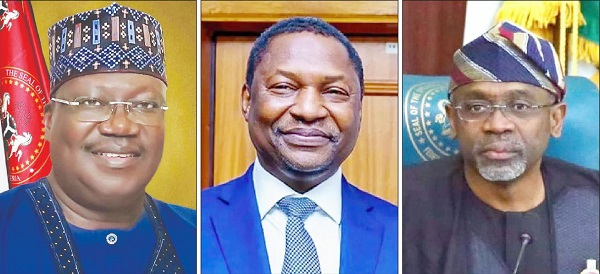News
Electoral Act: NASS Seeks Legal Advice, May Challenge Court Ruling

The National Assembly is shocked by Friday’s judgment from the Federal High Court, Umuahia, voiding Section 84 (12) of the Electoral Act and ordering its deletion forthwith, The Nation report.
Consequently, the legislative arm has started assembling a team of legal giants to study the judgment and advise it on the next line of action.
No less shocked by the court’s pronouncement are several senior lawyers who, yesterday, questioned the premise on which the judgment was based and the circumstances that birthed it.
But that is not the only issue with the act. The Independent National Electoral Commission (INEC) yesterday turned in its own assessment of the law, saying that some of its provisions are inimical to the electoral process.
The commission said it would seek practice direction on how to deal with the identified problems.
Investigation revealed that federal lawmakers were shocked that the Federal High Court voided and repealed Section 84(12) of the Act.
Their grouses include the following:
The ruling amounts to the erosion of the independence of the Legislature.
Neither the two chambers of the National Assembly nor the Independent National Electoral Commission (INEC) was joined as a party to the application.
No court can delete or repeal an Act but could void it.
*Since the ruling is still justiceable at the Court of Appeal and the Supreme Court, it is hasty for the Federal Government to gazette it.
A principal officer of the National Assembly, who spoke on the issue with our correspondent, said: “We were shocked by the decision of the court in a case we were not a party to. The National Assembly is already seeking legal advice on the next steps.
“Neither the two chambers of the National Assembly nor the Independent National Electoral Commission (INEC) was joined in a fundamental suit like this.
“The decision of the Federal High Court will no doubt undermine the legislative powers of the National Assembly. It may also set a bad precedent.
“More importantly, no court has the power to repeal an Act of the National Assembly.”
Responding to a question, the principal officer added: “The lawmakers have the right to seek redress in the Court of Appeal and the Supreme Court.”
Judgment a great error, says Falana
Senior Advocate of Nigeria and human rights advocate, Femi Falana, called the court order that Section 84(12) of the amended Electoral Act be deleted as a great error.
The contentious section stipulates that “No political appointee at any level shall be a voting delegate or be voted for at the convention or congress of any political party for the purpose of the nomination of candidates for any election.”
Justice Evelyn Anyadike, in her ruling, said the section ought to be struck down as it cannot stand when it is in violation of the clear provisions of the Constitution.
The said Sections 66(1)(f), 107(1)(f), 137(1)(f) and 182(1)(f) of the 1999 Constitution already stipulate that people employed in the public service of the federal or state government seeking to contest elections should resign at least 30 days to the date of the election.
But Falana, in a statement yesterday, said the judge “fell into a great error.”
His words: “Sections 66 (1) (f), 107(1) (f), 137 (1) (f) and 182 (1) (f) of the Constitution relied upon by his lordship require persons employed in the public service of either the Federal Government or State Governments.
“Specifically, each of the aforesaid sections provides that ‘No person shall be qualified for election into the Senate or House of Reps if:(f) he is a person employed in the public service of the Federation or of any State and has not resigned, withdrawn or retired from such employment 30 days before the date of election.’
“By virtue of section 318 of the Constitution, political appointees are not included in the list of persons employed in the public service. To that extent, section 84 (12) of the Electoral Act was annulled on a very faulty ground.
“No doubt, the Judge would have dismissed the case if his attention had been drawn to the cases of DADA v. ADEYEYE (2005) 6 NWLR (Pt. 920) 1 at 19 ASOGWA v. CHUKWU (2003) 4 NWLR (Pt. 811) 540 OJONYE V. ONU & ORS (2018) LPELR-44223) where the appellate Courts have held that political appointees or political office holders are not public servants as provided for under the Constitution.”
Another senior advocate, Mba Ukweni, said the National Assembly should challenge the judgment at the Court of Appeal.
He said: “If one wants to contest an election, you resign from your position. For instance, if somebody is working in INEC, you cannot run in an election after sometime. The law has a reason for that.
“An elective office is different from appointment. It has been there and it doesn’t violate any person’s rights.
“Rights are not absolute. I will want the National Assembly, if they are made a party to it, to challenge the decision.
“If I were a party in the case, I would challenge it in the higher court to have a second look at that provision.
“I have read that provision and it doesn’t appear to be in conflict with the constitution. Even the fundamental rights provided in the constitution are not absolute.
“If anyone wants to contest in an election and is holding a certain public office, he should resign.”
Ajulo: It’s a booby trap for APC
Constitutional and human rights lawyer, Dr. Kayode Ajulo, said the judgment could not stand in the face of the law.
He also predicted a higher risk for political office holders who may want to take advantage of it.
He raised three observations thus:
*The Judgment of the Court is per incuriam
*Political appointees are not public servants
*The National Assembly is a necessary party and has a right to set same aside on Appeal
*Compliance with the judgment of the trial court is a booby trap for the ruling APC.
He said: “While the position of our laws is clear to the effect that judgments of courts are valid until set aside on appeal no matter how erroneous they might be, however, considering the ratio decidendi of the decision of the court viz-a-viz the expediency and imminent consequence of the decision of the court on our political administration and party politics, it is therefore imperative to pensively dissect the judgment of the court in the light of the spirit of the Constitution and position of the Apex Court.
The Nation
-

 News4 days ago
News4 days agoBad Roads In Obaagun Township: An S.O.S. to Governor Ademola Adeleke By Dr. Wale Atoba
-

 News3 days ago
News3 days agoWomen Empowerment Takes Center Stage As UACC President, Rev’Owoyemi Declares Open 2024 UACC Women’s Conference In Ibadan
-

 News4 days ago
News4 days agoCSO Faults FIJ’s Reports On Ibrahim Egungbohun Dende, Says It’s Campaign Of Calumny
-

 Foreign News5 days ago
Foreign News5 days agoHow Nigerians Who Want To Japa To UK Can Become British Citizens



